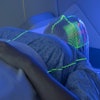Receiving radiation therapy (RT) increases the risk of developing hypothyroidism, or abnormally low thyroid hormone production, for patients with head and neck cancers. However, patients who do develop this condition may survive longer than those who do not, according to researchers at M. D. Anderson Cancer Center at the University of Texas in Houston.
These findings come from an analysis of almost 6,000 patients ages 65 and older who were treated for head and neck cancer in the U.S. between 1992 and 2002. Study results were published online in the journal Head & Neck (April 9, 2009).
Hypothyroidism is a well-known toxicity associated with radiation treatment, believed to be caused by radiation-induced parenchymal cell injury, fibrosis, and vessel damage. The M. D. Anderson study evaluated long-term outcomes of Medicare patients who received radiation therapy, radiation therapy and surgery, or surgery alone.
Of the 5,916 patients, 29% received radiation therapy and 41% had both surgery and radiation therapy. The mean age of the entire patient cohort was 75. The patients who were treated with radiation tended to have greater tumor involvement, including larger tumors, positive lymph nodes, and regionally invasive disease, according to lead author Dr. Grace Li Smith, Ph.D., a postdoctoral fellow in radiation oncology.
The risk of hypothyroidism for patients who had radiation therapy was 20% five years after treatment and 59% after 10 years. By comparison, the risk was 7% at five years and 39% at ten years for patients who only had surgery. There was no difference in risk between the group who received radiation therapy only and those who had radiation therapy and surgery.
The researchers did not identify any other factors that modified the association between radiation and hypothyroidism. They evaluated sex, race, geographic region, comorbidities, chemotherapy, neck dissection, and presence of positive lymph nodes.
The study covered a 12-year time period. Fifty-five percent of the patients died during this time, including 18% as a result of the head and neck cancer. Among the subgroup of patients who received radiation therapy, 61% died, including 22% from cancer. However, the researchers reported that the patients who developed hypothyroidism as a result of radiation therapy experienced significantly longer overall survival and cause-specific survival, even after adjusting for all covariates, including tumor characteristics and treatment. They recommended further investigation.
The National Comprehensive Cancer Network (NCCN) guidelines recommend thyroid screening every six to 12 month for patients whose thyroids have been exposed to high doses of radiation. The findings of this study suggest that thyroid function screening continue throughout the lifetimes of older patients.
Related Reading
Hypothyroidism linked to better survival in head and neck cancer, November 2, 2006
Copyright © 2009 AuntMinnie.com



















